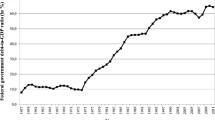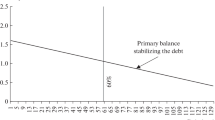Abstract
The question whether fiscal policies are sustainable in the long run has received much attention in the international political agenda. In this paper, we investigate whether Austrian fiscal policy has been sustainable during the last four decades. We apply several econometric approaches to test for the sustainability of fiscal policies. The results are ambiguous. For the period of 1960–1974, we find evidence for sustainable fiscal policies. For the period 1975–1999, the results indicate that Austrian fiscal policy was not sustainable in the long run. If Austrian policy-makers do not change their budgetary policy in the future, the long-term budget constraint of the state will be violated.
Similar content being viewed by others
References
Barro, R. J. (1986) 'U.S. Deficits Since World War I', Scandinavian Journal of Economics 88, 195–222.
Bohn, H. (1998) 'The Behavior of U.S. Public Debt and Deficits', Quarterly Journal of Economics 113, 949–963.
Breuss, F. (1999) 'Wozu fiskalische Tragfähigkeit in der Wirtschafts-und Währungsunion der Europäischen Union?', in R. Neck and R. Holzmann, eds., Was wird aus Euroland? Makroökonomische Herausforderungen und wirtschaftspolitische Antworten. pp. 92–159. Manz, Vienna.
De Grauwe, P. (2000) Economics of Monetary Union. Oxford University Press, Oxford.
Flood, R. P. and Garber, P. M. (1980) 'Market Fundamentals versus Price Level Bubbles: The First Tests', Journal of Political Economy 88, 745–770.
Greiner, A. and Semmler, W. (1999) 'An Inquiry into the Sustainability of German Fiscal Policy: Some Time-Series Tests', Public Finance Review 27, 220–236.
Gros, D. and Thygesen, N. (1998) European Monetary Integration. Addison Wesley-Longman, Harlow.
Hamilton, J. D. and Flavin, M. A. (1986) 'On the Limitations of Government Borrowing: A Framework for Empirical Testing', American Economic Review 76, 808–819.
Neck, R. and Getzner, M. (2000) 'Politisch-ökonomische Einflüsse auf das Staatsschuldenwachstum: Eine Fallstudie für Österreich', in R. Neck, R. Holzmann and F. Schneider, eds., Staatsschulden am Ende? Ursachen, Wirkungen und Zukunftsperspektiven. pp. 43–73. Manz, Vienna.
Papadopoulos, A. P. and Sidiropoulos, M. G. (1999) 'The Sustainability of Fiscal Policies in the European Union', International Advances in Economic Research 5, 289–307.
Trehan, B. and Walsh, C. E. (1991) 'Testing Intertemporal Budget Constraints: Theory and Applications to U.S. Federal Budget and Current Account Deficits', Journal of Money, Credit, and Banking 23, 206–223.
Wilcox, D. W. (1989) 'The Sustainability of Government Deficits: Implications of the Present-Value Borrowing Constraint', Journal of Money, Credit, and Banking 21, 291–306.
Author information
Authors and Affiliations
Rights and permissions
About this article
Cite this article
Getzner, M., Glatzer, E. & Neck, R. On the Sustainability of Austrian Budgetary Policies. Empirica 28, 21–40 (2001). https://doi.org/10.1023/A:1010927632670
Issue Date:
DOI: https://doi.org/10.1023/A:1010927632670




